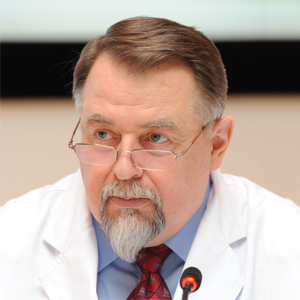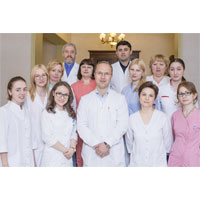Chief neurologist of National Medical and Surgical Center named after N.I. Pirogov: Vinogradov Oleg Ivanovich, M.D., Ph.D., chair of the department of neurology with a course of neurosurgery.
Chief of the department: Mushba Astanda Vasilievna, M.D., neurologist.
Diseases and conditions that we treat
In our practice we use time-tested approaches in combination with modern methods of examination, treatment and prevention of neurological diseases recognized by the world professional community. Our priorities are a comprehensive individual approach to the patient, active interaction with physicians of related specialties, aspiration to achieve maximum success in the treatment of each patient.
Doctors of the neurology department also conduct scientific work, have scientific degrees. Doctors of the neurology department regularly undergo internships in leading clinics of the USA, Germany, Austria, Great Britain, Israel, Spain, Portugal.
In our department we treat patients with the whole range of neurological pathology:
Ischemic stroke
We provide acute stroke treatment, thrombolytic therapy (thrombolysis), thromboembolic extraction, complex neurofunctional and vascular diagnostics.
Hemorrhagic stroke
We realize the complex diagnostics, selection of basic therapy and actions for prevention of recurrent strokes. We also consider identified risk factors and mechanisms of stroke development. The tactics of treatment is determined with the doctors of related specialties — neurosurgeons, endovascular surgeons.
The doctors apply special programs to identify the risk factors for stroke, establishing the mechanism of stroke, selecting individual regimens of therapy that protect both from the first developed and repeated violations of the cerebral circulation.
The diagnostics of cerebrovascular diseases (in common with the department of radionuclide and functional diagnostics) includes:
- Ultrasound duplex scanning of brachiocephalic vessels
- Triplex scanning of the arteries of the Willis circle with registration of microembolic signals
- Echocardiography (ultrasound of the heart)
Anticoagulant therapy
- For patients who have been taking anticoagulant therapy for atrial fibrillation for a long time, after prosthetic heart valves, in connection with valvular heart disease
Doctors of the anticoagulant therapy room will help to:
- Carry out an individual selection of anticoagulant, taking into account a preliminary assessment of the risk of thromboembolic complications, bleeding, assessment of kidney function, according to international scales (CHA2DS2-VASc, HAS-BLED, creatinine clearance according to the Cockcroft-Gault formula)
- Determine the regimen of administration and dose of anticoagulant
- Carry out a correction of the regimen of intake and dose for routine or emergency surgery, when evaluating the drug interaction, with the development of bleeding
- To carry out the control of a functional condition of kidneys, a liver on a background of long reception of anticoagulant therapy
Encephalopathy
We provide complex diagnostics, treatment of chronic vascular diseases of the brain, selection of therapy for the prevention of cardiovascular complications (strokes, heart attacks), taking into account identified risk factors.
Cognitive disorders (vascular dementia, dementia with Lewy bodies, Alzheimer’s disease)
Determination of the causes and mechanisms of the development of cognitive disorders, followed by the selection of therapy aimed at slowing the progression of the disease and improving the quality of life of the patient.
Demyelinating diseases of the central nervous system (multiple sclerosis, disseminated encephalomyelitis)
During the exacerbation, plasmapheresis methods, pulse-therapy with glucocorticosteroids are used, during remission — disease-modifying therapy is recommended.
Demyelinating diseases of the peripheral nervous system (Guillain-Barre syndrome, chronic inflammatory demyelinating polyneuropathy)
The methods of plasmapheresis, remyelinization therapy.
Parkinson’s disease
Individual therapy aimed at slowing the progression of the disease and improving the quality of patient’s life.
Spasticity
The use of botulinum toxin type A is applied in the treatment of post-stroke, post-traumatic spasticity, torticollis, headeaches, blepharospasm, gemifascial spasm. Installing a baclofen pump is an option for patients with generalized spasticity.
Back pain
The purpose of diagnosis is determining the cause of back pain (MRI of the spine, electroneuromyography), individual selection of therapeutic methods.
Vertigo (syndrome of the vertebral-basilar arterial system, benign paroxysmal positional vertigo, vestibulopathy)
Headache
Identification of the causes of headaches, selection of individual therapy regimens.
Myasthenia gravis
A comprehensive examination, individual selection of therapy for compensation of acute conditions or slowing the progression of the disease and improvement of the quality of the patient’s life.
Trauma of the brain, spinal cord, peripheral nervous system
A complex of diagnostic measures is carried out to determine the scope and nature of traumatic injury, the choice of individual treatment tactics.
Insomnia, obstructive sleep apnea syndrome
In the somnological laboratory, complex diagnosis and treatment of sleep and snoring disorders is carried out. Pulse oximetry, cardio-respiratory monitoring, polysomnography are performed. Based on the results of the survey, CPAP-therapy is selected under the guidance of a somnologist, individual selection of medication therapy taking into account the concomitant pathology.
Diagnosis and correction of sleep disorders
Diagnostic methods:
- Computer pulse oximetry
- Cardio-respiratory monitoring
- Polysomnography
Treatment methods:
- CPAP therapy
- BiPAP-therapy
- Pharmacotherapy
Contact Information
Address: 105203, Moscow, Nizhnyaya Pervomayskaya str., 70
Contact phone number:
Fax:
How to reach us by using public transport
“Pervomaiskaya” metro station (last carriage of the train out of the city centre). From “Pervomaiskaya” metro station by any tram or trolley bus go to the stop “15th Parkovaya Street”. Go along the 15th Park Street to the intersection with the Nizhnyaya Pervomaiskaya Street, turn left and walk about a hundred meters to the entrance of the Pirogov National Medical and Surgical Center.













